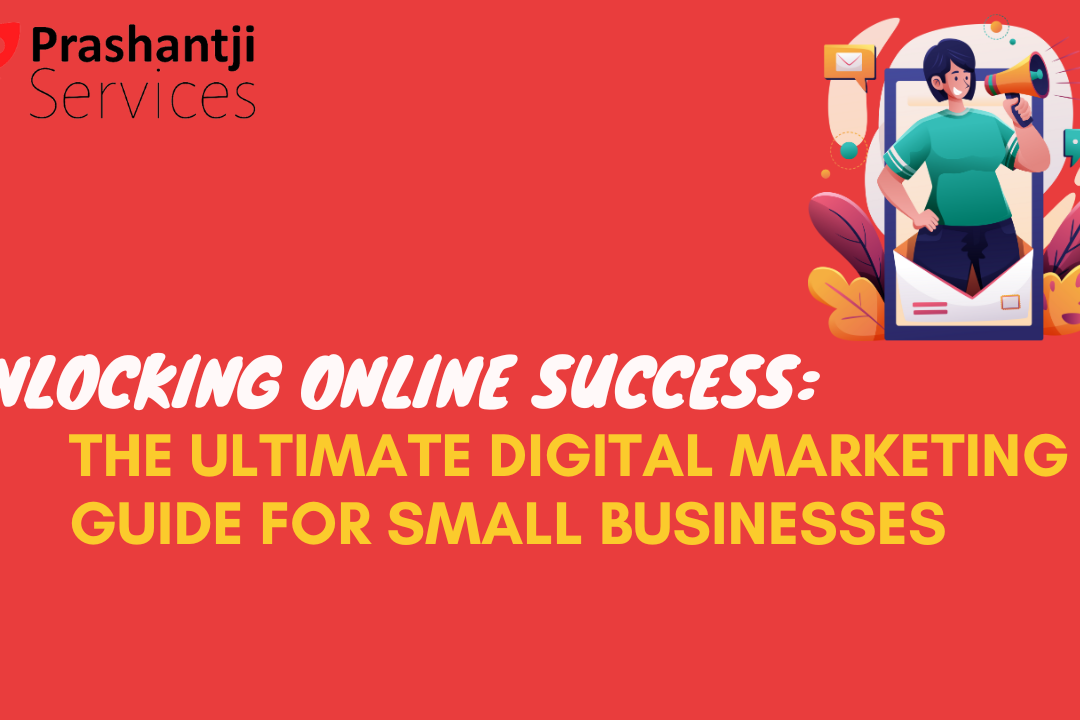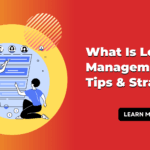In today’s fast-paced world, the success of small businesses largely depends on their online presence. This is where digital marketing comes into play. With its vast array of tools and techniques, digital marketing has become a game-changer for small businesses looking to enhance their online visibility and boost their sales. However, navigating through the world of digital marketing can be overwhelming, especially if you’re new to it. That’s why we’ve created this ultimate guide to help you understand what digital marketing is all about and how you can leverage it to take your small business to greater heights! So buckle up and get ready for an exciting journey into the world of digital marketing!

Introduction: Why Digital Marketing is Vital for Small Businesses
Digital marketing has become an essential tool for small businesses to reach out to their target audience. In today’s digital age, consumers are increasingly using the internet to search for products and services. This makes it critical for small businesses to have a strong online presence in order to stay competitive.
By implementing effective digital marketing strategies, small businesses can tap into a larger market share, increase brand awareness, and ultimately boost sales. Digital marketing allows small businesses to cost-effectively reach their target audience through targeted advertising on social media platforms like Facebook or Instagram.
Moreover, digital marketing provides measurable results that help business owners understand how their campaigns are performing and what changes they need to make in order to improve them further. With access to real-time data analytics, business owners can track the performance of their ads and adjust them accordingly based on consumer behavior trends.
Ultimately, by investing in digital marketing efforts such as SEO optimization or pay-per-click advertising campaigns, small businesses can create long-term customer relationships while increasing revenue growth potential over time. Therefore, understanding the importance of digital marketing is crucial for any successful small business operation looking towards expanding its horizons in today’s world of internet-driven commerce.
Benefits of Digital Marketing for Small Businesses: Unlocking Growth Opportunities
Digital marketing has become increasingly important for small businesses in recent years. One of the biggest advantages of digital marketing is that it allows you to reach a larger audience than traditional forms of advertising. With millions of people online every day, your business can easily get noticed by potential customers.
Another benefit is cost-effectiveness. Digital marketing campaigns are often less expensive than traditional advertising methods and offer better return on investment (ROI). You can target specific demographics with precision and track results in real time, allowing you to make data-driven decisions.
Furthermore, digital channels provide opportunities for engagement and interaction with customers. Social media platforms allow small businesses to build brand awareness, engage with followers and create an authentic relationships with their audience. In addition, digital marketing offers flexibility as it allows you to adapt your strategy quickly based on changes in customer behavior or market trends. This nimbleness ensures that small businesses stay relevant in today’s ever-changing landscape.
Implementing a successful digital marketing strategy helps establish credibility and trust among consumers which ultimately leads to increased revenue over time. By creating a strong online presence through various channels such as social media platforms or email newsletters, small businesses are able to gain the trust of potential customers who may have initially been hesitant about doing business with them. There are numerous benefits associated with utilizing digital marketing strategies for small businesses including wider reach at low costs enabling higher ROI; greater customer engagement through personalized communication channels leading towards creating a more reliable brand image resulting in ultimate success!

Setting SMART Goals and Objectives for Effective Digital Marketing
When it comes to digital marketing for small businesses, setting clear goals and objectives is crucial. Without them, you won’t know where you’re heading or whether your efforts are paying off.
Firstly, start by identifying what your business wants to achieve through digital marketing. Do you want to increase website traffic? Generate more leads? Boost sales revenue? Whatever it may be, ensure that the goals are specific, measurable, achievable, relevant and time-bound (SMART).
Once you have a list of SMART goals in place, break them down into smaller objectives. These will help guide your day-to-day activities and allow for easier tracking of progress toward achieving those bigger goals.
It’s also important to consider how each goal aligns with your overall business strategy. Digital marketing should complement rather than replace traditional methods of promoting your business.
Remember that setting achievable but challenging targets can motivate both yourself and your team in working hard towards success. And always track the progress regularly so that changes can be made if necessary.
Taking the time to set clear digital marketing goals and objectives can make all the difference between struggling aimlessly or making meaningful strides forward as a small business owner trying to establish an online presence.
Defining Your Target Audience: Key to Precision Marketing Success
Defining your target audience is a crucial step in any digital marketing strategy for small businesses. You need to have a clear understanding of who your ideal customers are so that you can tailor your marketing efforts to reach them effectively.
To define your target audience, start by creating buyer personas that represent the different types of people who would be interested in what you offer. Consider factors such as age, gender, location, income level, interests and behaviors.
Once you have identified your buyer personas, conduct research to understand their needs and pain points. This will help you create content and messaging that resonates with them. Use social media analytics tools or surveys to gather insights on their preferences and habits.
It’s also important to keep track of changes in the market or trends that might affect how they perceive your product or service. Regularly review and update your target audience as needed based on new information gathered from customer feedback or data analysis.
By defining your target audience clearly, you’ll be able to create more effective marketing campaigns that generate leads and conversions while minimizing ad spend waste on audiences less likely to convert.

Measuring Success: Establishing Trackable and Measurable Goals
Establishing measurable goals is a critical step in developing an effective digital marketing strategy for small businesses. Without clearly defined goals, it’s difficult to determine whether your efforts are successful or not.
To start, consider what you want to achieve with your digital marketing campaign. Is it increased website traffic, higher conversion rates, or more social media followers? Whatever your goal may be, make sure it’s specific and measurable.
Next, break down your overall goal into smaller objectives that can be tracked and measured over time. This will allow you to see progress toward achieving your main goal and make adjustments if necessary.
It’s also important to set realistic deadlines for achieving these goals. Make sure they’re achievable within the timeframe you’ve established and adjust them as needed based on changes in the market or other factors.
Track your progress regularly using data analytics tools such as Google Analytics. This will help you identify areas where improvements can be made and optimize future campaigns accordingly. By establishing measurable goals upfront and tracking progress along the way, small businesses can ensure their digital marketing efforts are successful in reaching their intended audience.
Building an Effective Website: Optimizing for User Experience and Search Engines
Building an effective website is crucial for any small business looking to establish a strong online presence. A well-designed website not only attracts potential customers, but also provides them with valuable information about your products or services.
One important factor to consider when building a website is the user experience. The site should be easy to navigate and visually appealing, with clear calls-to-action encouraging visitors to take the next step towards making a purchase or contacting your business.
Another key consideration is search engine optimization (SEO). Your website should be optimized for relevant keywords related to your industry in order to rank higher on search engines like Google. This can include using meta tags, optimizing images and videos, and regularly publishing high-quality content.
It’s also important to ensure that your website is mobile-friendly. With more people accessing websites from their smartphones than ever before, having a responsive design that adjusts seamlessly across different devices can make all the difference in attracting and retaining customers.
Building an effective website requires careful planning and attention to detail. By prioritizing user experience, SEO optimization, and mobile responsiveness, you can create a powerful tool for reaching new customers and growing your small business online.

Social Media Marketing: Leveraging Platforms to Engage and Expand Reach
Social media has become an essential part of our daily lives, and it is no surprise that it has also become a vital tool for small businesses to market their products or services. With billions of users on social media platforms like Facebook, Instagram, Twitter, and LinkedIn, the potential reach for your business is enormous.
One significant benefit of social media marketing is the ability to interact with customers on a personal level. By responding to comments and messages promptly, you can build trust and establish long-lasting relationships with your target audience.
Another advantage is the cost-effectiveness of social media advertising compared to traditional forms of marketing. You can create targeted ads based on demographics such as age, gender or location resulting in efficient use of resources.
To make the most out of your social media presence ensure that you have clear brand messaging and visually appealing content tailored towards each platform’s unique audience. Consistent posting helps increase engagement rates which signals algorithms to show more people your post.
Remember not all platforms are created equal- so research where your ideal customer spends their time online before investing too much energy into one specific channel!
Online Advertising Strategies: Maximizing ROI with Targeted Campaigns
Online advertising is an effective way to reach potential customers and promote your small business. With the right strategy, you can target specific audiences with relevant ads that drive traffic to your website.
One of the biggest advantages of online advertising is its cost-effectiveness. You don’t need a huge budget to create targeted campaigns across social media platforms like Facebook and Instagram. These platforms allow you to specify demographics, interests, behaviors, and more when targeting your ad audience.
Another benefit of online advertising is its ability to track results in real time. By using tools like Google Analytics or Facebook Ads Manager, you can measure how many people clicked on your ad, how long they spent on your website after clicking through the ad, and whether they completed any desired actions (like making a purchase or filling out a form).
However, it’s important not to rely solely on paid advertising for all of your marketing efforts. A well-rounded digital marketing strategy should also include organic social media posts and search engine optimization (SEO) tactics.
Ultimately, by incorporating online advertising into your overall digital marketing plan – while keeping an eye on costs and tracking results – you can increase brand awareness for your small business and attract new customers who are looking for what you have to offer.

Conclusion: Implementing a Successful Digital Marketing Strategy for Small Businesses
In conclusion, digital marketing has become an indispensable tool for small businesses seeking to thrive in today’s competitive online landscape. By understanding the importance and benefits of digital marketing, setting SMART goals and objectives, defining your target audience, building an effective website, and leveraging social media and online advertising platforms, you can implement a successful digital marketing strategy for your small business.
Prashantji Services, a leader in digital marketing, is here to help you boost your online presence and achieve your business goals. With their expertise in ROI-based marketing strategies, they can tailor a customized approach to ensure maximum results for your small business.
Remember that digital marketing requires continuous effort and adaptation as technology evolves. Stay up-to-date with industry trends, leverage data analytics to make informed decisions, and be willing to experiment with new strategies to find what works best for your business.
By partnering with Prashantji Services and implementing a well-crafted digital marketing strategy, you can establish a strong online presence, attract targeted customers, and drive business growth. Take the first step towards success by embracing digital marketing and unlocking the full potential of your small business.








